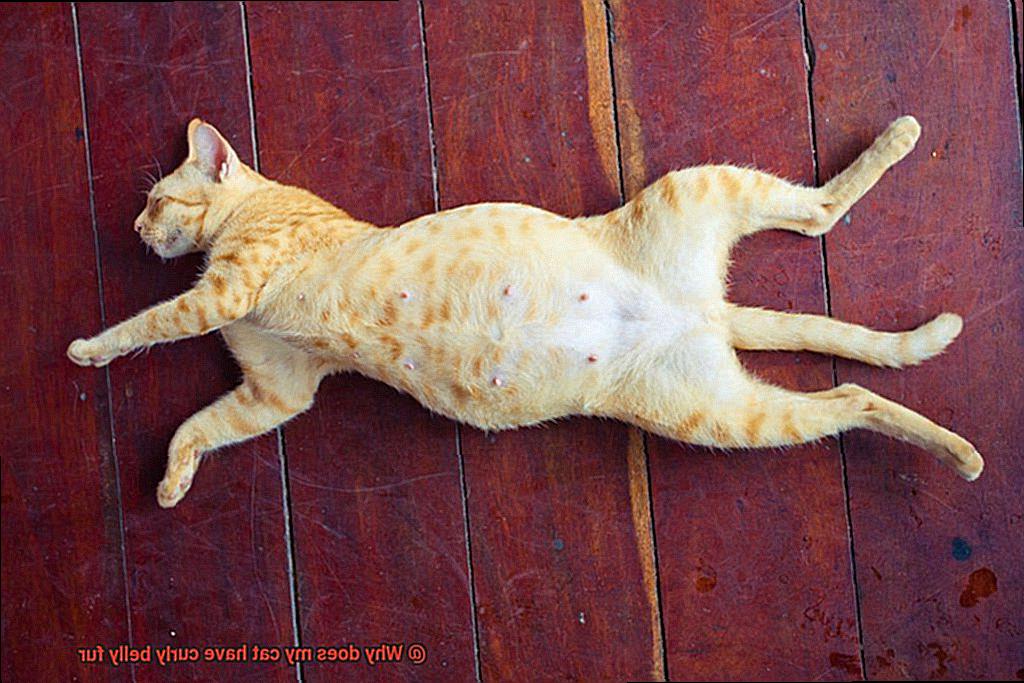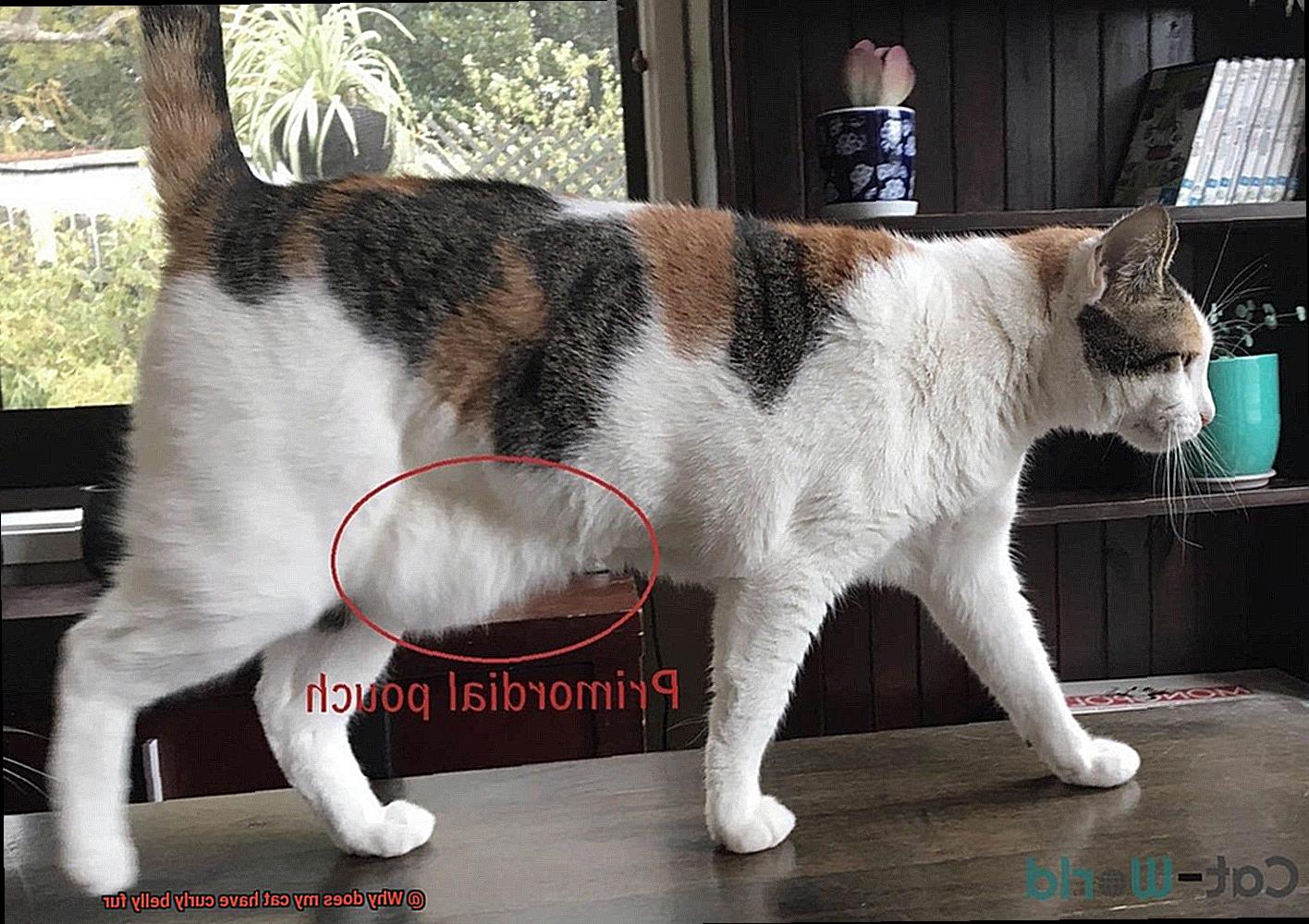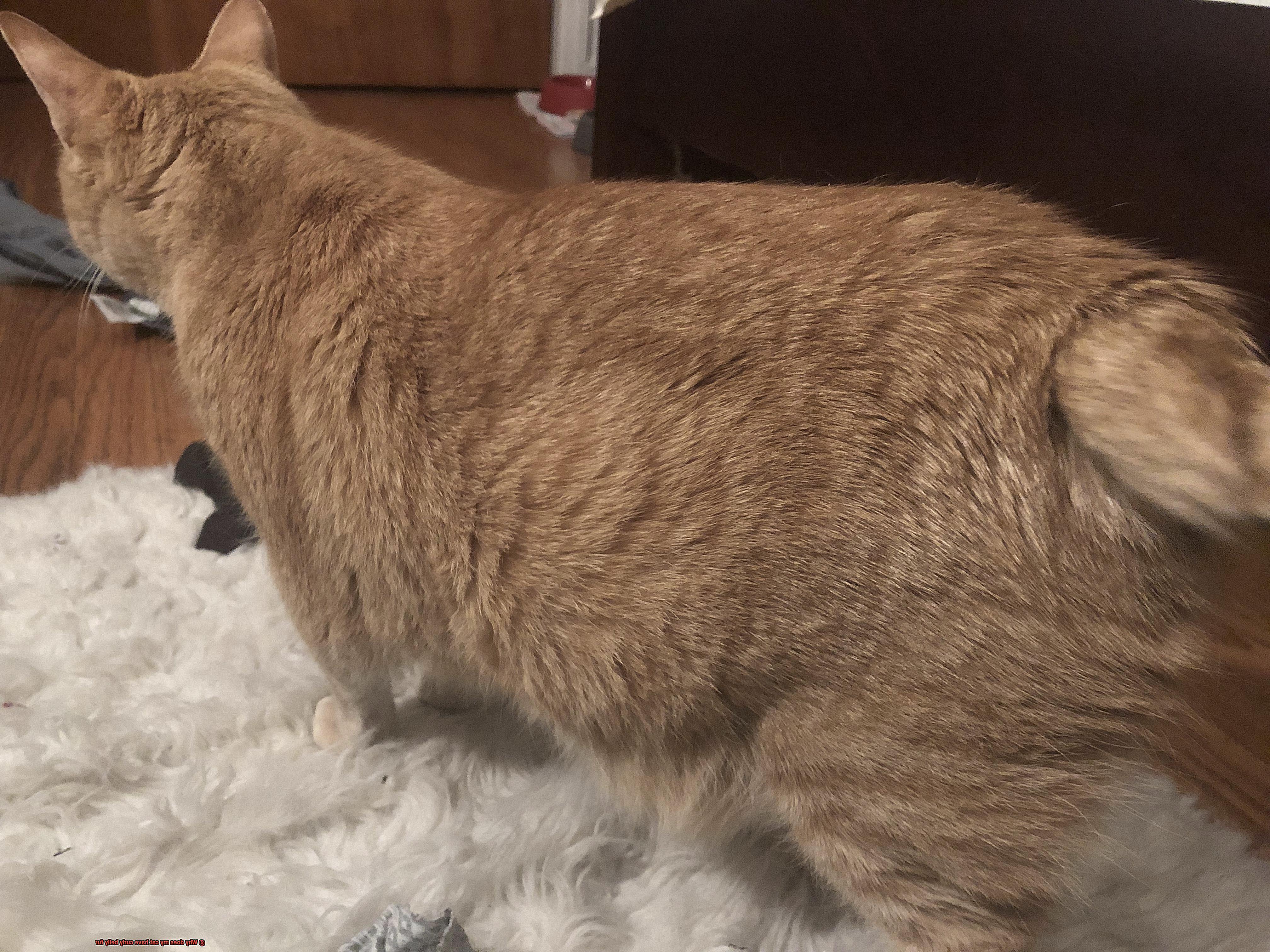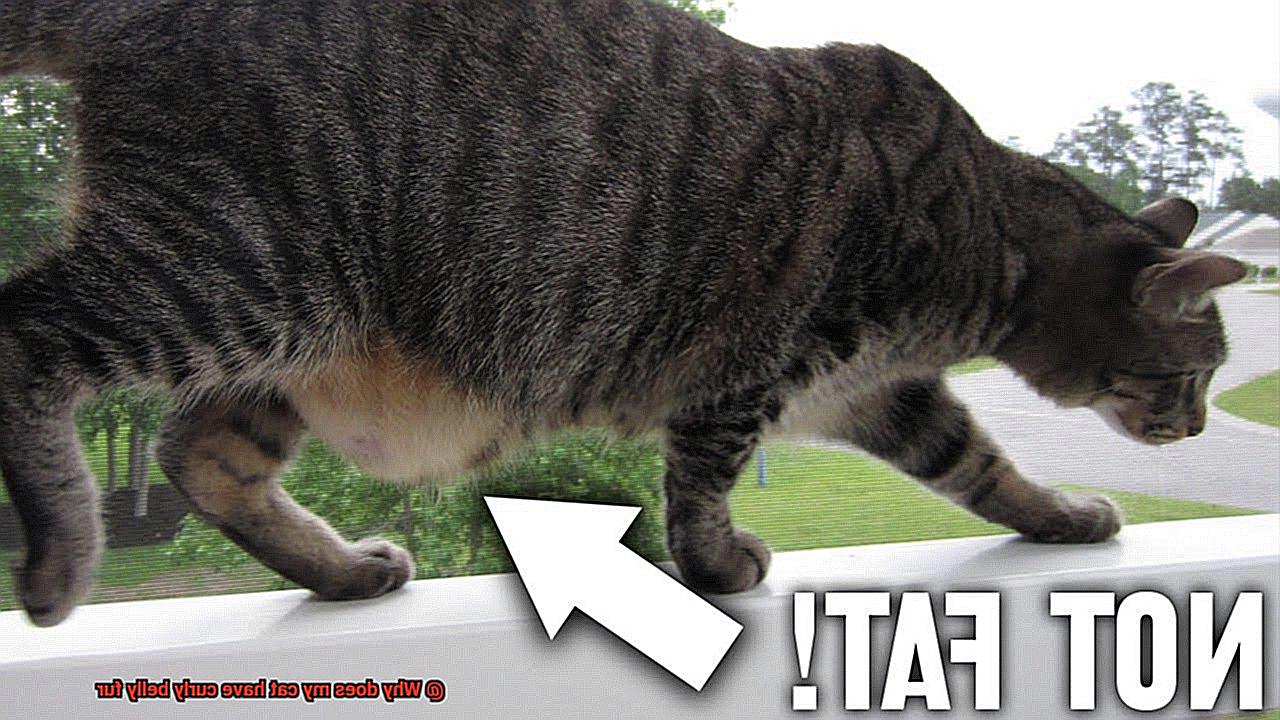Have you ever noticed that your furry feline’s belly fur is curly? It’s a quirky and adorable feature that many cat owners love, but have you ever wondered why it happens?
Genetics play a crucial role in determining the curliness of cat fur. The genes responsible for hair growth can vary greatly between different breeds and even within the same breed. Therefore, curly cat fur can be attributed to the cat’s genes.
Interestingly, cats with multiple layers of hair, like the Cornish Rex, are more susceptible to curly fur than other cats. These breeds have unique hair follicles that cause a luscious curly coat on their belly fur and even all over their body.
But what about environmental factors? Can they also cause curly belly fur? Yes. Moisture or humidity can cause your cat’s fur to curl due to its fragile nature. This is perfectly natural and won’t harm your furry friend in any way.
In conclusion, there are various reasons why your cat may have curly belly fur, from genetics to environmental factors. But no matter what the reason is, it’s nothing to worry about. So if you have a kitty with this unique trait, embrace it and give them some extra love and belly rubs. They deserve it.
Genetics: Are Certain Breeds Prone to Curly Belly Fur?
Well, genetics is the primary factor that determines whether or not a cat will have curly belly fur. Some breeds are more prone to this trait due to their genetic makeup.
The Selkirk Rex is one such breed known for its curly fur all over its body, including its belly. The Selkirk Rex gene is dominant and can be passed down to offspring, which means that even if only one parent has the gene, there is a chance that their kittens will have curly fur. Another breed that may have curly belly fur is the Devon Rex, which has a unique mutation that causes its fur to be shorter and curlier than most other cats. While the Devon Rex’s fur is not necessarily curly on its belly, it still serves as an example of how genetics can influence a cat’s coat.
However, it’s important to note that not all cats with curly belly fur are purebred. Some domestic shorthair cats may also have curly belly fur due to their genetic makeup. It’s possible that their ancestors had the genes for curly fur, and those genes were passed down through generations.
While genetics may be the primary cause of curly belly fur in cats, there could be other reasons why their belly fur is curly. Nutritional deficiencies or a poor diet may lead to weak and brittle hair that may appear curly or frizzy. Additionally, skin irritation or infection could also cause your cat’s hair to become tangled and curly.
It’s essential to monitor your cat’s behavior and overall health to determine whether their curly belly fur is just a harmless quirk or a symptom of a more serious issue. Consulting with your veterinarian if you notice any concerning symptoms such as excessive scratching, hair loss, or changes in appetite or behavior is always recommended.
Nutrition: Could a Poor Diet Be the Cause of Curly Belly Fur?
While genetics certainly play a role, it’s important to consider nutrition as a possible cause of this trait.
You see, a cat’s diet is essential for maintaining their overall health, including the condition of their coat. Without the right nutrients, their hair follicles won’t receive the necessary building blocks to grow strong and healthy hair. This can result in brittle, dry, and curly fur.
Specifically, cats need high-quality protein sources like chicken, fish, and beef for healthy skin and coat development. A lack of protein in their diet can lead to sparse, brittle, and curly fur. So be sure to provide your kitty with a balanced diet that includes these essential protein sources.
In addition to protein, cats also require essential fatty acids like Omega-3 for maintaining healthy skin and coat. These fatty acids help keep the skin moisturized and prevent it from becoming dry and flaky. Without enough of these fatty acids in their diet, your cat may develop dry and curly fur.
But don’t worry – you can easily add Omega-3 fatty acids to your cat’s diet through fish oil or flaxseed oil supplements. These supplements are rich in the essential fatty acids that your cat needs for healthy skin and coat.
Skin Irritation or Infection: Is My Cat Scratching Too Much?
If you have noticed your cat scratching their belly more frequently than usual, it could be an indication of an underlying skin issue.
Excessive scratching is often caused by skin irritation or infection and can lead to harm to your pet’s gorgeous fur. Allergies, parasites, and fungal infections are common culprits of these problems.
Allergies can be triggered by various factors, such as food, pollen, dust, or certain fabrics. If your cat is allergic, they may scratch their belly persistently in an attempt to soothe the itchiness. Identifying the source of the allergy is crucial to eliminate it from your cat’s environment.
Parasites like fleas, ticks, and mites can cause skin irritation and lead to excessive scratching. These tiny bugs can easily infest your cat’s fur and cause discomfort. If you suspect that your cat has a parasite infestation, taking them to the vet for a proper diagnosis and treatment is essential.

Fungal infections like ringworm can also trigger skin irritation and excessive scratching. This type of infection spreads easily and can be highly contagious to other pets or humans in the household. It’s crucial to seek veterinary care immediately if you suspect that your cat has a fungal infection.
Ignoring the issue could cause further harm to your cat’s fur and potentially more severe health issues down the line. Therefore, it’s vital to take any excessive scratching seriously and seek veterinary care promptly. Your vet will be able to identify the underlying cause of the scratching and recommend appropriate treatment options.

Signs to Watch Out For: What Symptoms Should I Look For?
While it may look adorable, it’s important to keep an eye out for any signs or symptoms that could indicate an underlying health issue. As a cat expert, I’m here to provide you with the necessary information to ensure your feline friend remains healthy and happy.
One symptom of concern is excessive licking or grooming of the belly area. If your cat is constantly grooming their belly, it could be a sign of skin irritation or discomfort. This can lead to curly fur as the constant grooming disrupts the natural growth pattern of the hair.
Another symptom to look out for is bald patches or thinning hair on the belly. These symptoms could be an indication of ringworm or dermatitis, both of which are skin conditions that cause irritation and inflammation. This can result in curly or frizzy fur.
It’s essential to pay attention to any changes in your cat’s behavior. If they seem lethargic, have a decreased appetite, or are avoiding certain areas of the house, it could be a sign of pain or discomfort related to their curly belly fur.
As a responsible pet owner, it’s crucial to seek veterinary care immediately if you notice any of these symptoms. Identifying the root cause and providing appropriate treatment options can prevent any further complications from arising. By being observant and proactive, you can ensure that your furry companion maintains their beautiful coat, including their curly belly fur.
Consulting with a Veterinarian: When Should I Seek Professional Help?
So, when it comes to the well-being of your feline friend, when should you seek professional help from a veterinarian?
One common symptom that may seem harmless, but could be a sign of a serious health issue, is curly belly fur. This could indicate allergies, parasites, hormonal imbalances, or skin infections that need immediate attention. These conditions can cause discomfort and even lead to more serious health problems if left untreated. So, it’s important to consult with a veterinarian to rule out any underlying health conditions and get your cat the care they need.
But how do you know when it’s time to seek professional help? If you notice any other concerning symptoms such as excessive scratching, hair loss, or changes in behavior or appetite, it’s crucial to seek help from a vet right away. Your veterinarian can perform a thorough physical exam and run diagnostic tests to identify any underlying conditions and provide appropriate treatment options.

In addition to seeking professional help when symptoms arise, it’s also important to schedule regular wellness exams for your cat. These exams can detect any underlying health issues before they become more serious and provide valuable information on preventative care measures to keep your cat healthy and happy for years to come.
Jho8msMveig” >

Prevention and Management Strategies: How Can I Avoid Curly Belly Fur in My Cat?
Curly belly fur is a common issue that can cause discomfort and even pose a risk to your cat’s health if left unmanaged. But fret not, because there are simple prevention and management strategies that you can implement to keep your cat’s coat shiny, smooth, and healthy.
Regular Grooming
The key to preventing curly belly fur in cats is regular grooming. Brushing and combing your cat’s coat on a daily basis can help remove loose hair, prevent matting, and distribute natural oils throughout the coat. This will not only help prevent tangles, knots, and curly belly fur but also give you quality bonding time with your feline friend. Using a proper grooming tool that suits your cat’s hair type and length can make the process easier and more effective.

For cats with long or thick hair, daily grooming may be necessary to prevent tangles and knots. It’s also important to pay attention to your cat’s skin and coat health and address any issues promptly, such as fleas, ticks, allergies, or infections.
Healthy Diet
A healthy diet can also contribute to a glossy, smooth coat and reduce the risk of curly belly fur. Feeding your cat high-quality, balanced food that meets their nutritional needs can improve skin and coat health from within. Foods rich in omega-3 fatty acids, such as fish or flaxseed oil, can help promote healthy skin and fur. Additionally, ensuring that your cat drinks enough water will also help flush out toxins from their body.
Stress-Free Environment
A stress-free environment is vital in preventing curly belly fur in cats. Cats that are stressed or anxious may over-groom themselves, leading to hair loss or damage. Providing plenty of toys, scratching posts, hiding spots, and comfortable resting areas can help reduce stress and promote a healthy coat. Make sure your cat has a space to retreat to if they’re feeling overwhelmed and avoid sudden changes in their routine or living environment.
Prompt Attention
If your cat already has curly belly fur or other coat issues, it’s crucial to address them promptly with the help of a veterinarian or professional groomer. They can provide advice on the best grooming tools and techniques for your cat’s specific needs, as well as address any underlying health issues that may be contributing to the problem. Early intervention will prevent the issue from worsening and causing discomfort to your cat.
Also Read: Maine Coon Whiskers
Conclusion
To wrap things up, curly belly fur in cats is a delightful and distinctive attribute that many cat owners adore. Although genetics play a significant role in determining whether your feline friend will have curly hair, environmental factors such as humidity can also contribute to the curliness of their fur. Certain breeds like the Selkirk Rex and Devon Rex are more likely to have curly fur due to their genetic predisposition, but even domestic shorthair cats may possess this trait.
It’s crucial to keep an eye on your cat’s behavior and overall health to determine whether their curly belly fur is just a harmless quirk or a symptom of a more severe problem. Nutritional deficiencies or poor diet can lead to weak and brittle hair that may appear frizzy or curly. Additionally, skin irritation or infection could cause your cat’s hair to become tangled and curly.
Regular grooming, providing a healthy diet, creating a stress-free environment, and being attentive are all essential strategies you can implement to ensure your cat’s coat remains shiny, smooth, and healthy. By actively monitoring your furry friend’s well-being and taking prompt action when necessary, you can help them maintain their beautiful coat – including their adorable curly belly fur.







